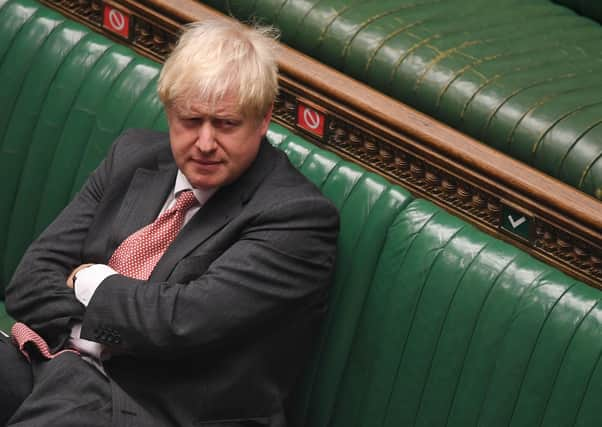Boris Johnson: My Brexit deal will stop UK breaking up


MPs passed the bill, after a bid by Labour to have the reading blocked, on a second reading by 340 votes to 263 a majority of 77.
The Prime Minister insisted the legislation, which would put the UK in breach of international law by breaking the terms of the treaty signed with Brussels, a fact admitted by the government, was a necessary “legal safety net” to protect the relationship between Great Britain and Northern Ireland.
Advertisement
Hide AdAdvertisement
Hide AdAs he sought to quell a growing Tory revolt, he claimed that passing the legislation would strengthen the hand of negotiators trying to strike a trade deal with the EU. In an effort to reassure Conservative MPs, Mr Johnson said the measures contained in the bill to set aside parts of the Brexit deal were an “insurance policy” that he hoped would “never be invoked” if an agreement was reached with Brussels.
And he promised that if it was necessary for the powers to be used, MPs would be given a vote on the regulations.
He also warned that “we cannot have a situation where the very boundaries of our country can be dictated to by a foreign power or international organisation”.
“What we cannot tolerate now is a situation where our EU counterparts seriously believe they have the power to break up our country,” he told MPs
This comes as opposition to the Conservative government’s handling of Brexit is being credited by the SNP with helping fuel support for Scottish Independence,
The Internal Market Bill sets out the way that trade within the UK will work once outside the EU’s single market and customs union.
All the living former prime ministers have voiced concern over the potential breach of international law, while ex-attorney general Geoffrey Cox and former chancellor Sajid Javid have added to high-profile Conservative criticism of the measure.
Mr Johnson, taking the unusual step of opening the debate on the legislation in the House of Commons, accused the EU of going to “extreme and unreasonable lengths” over the Northern Ireland Protocol which he said could lead to “blockading food and agriculture transports within our own country”.
Advertisement
Hide AdAdvertisement
Hide AdThe measures, contained in the deal negotiated and championed by the Prime Minister last year, were designed to prevent a hard border on the island of Ireland by keeping Northern Ireland aligned with EU customs rules.
Warning that the EU could seek to act in other “absurd ways”, slapping tariffs on trade between Great Britain and Northern Ireland, Mr Johnson said that “if they fail to negotiate in good faith” the UK must introduce a “package of protective powers”.
David Cameron became the latest former prime minister to criticise the legislation, saying he had “misgivings” as “passing an Act of Parliament and then going on to break an international treaty obligation is the very, very last thing you should contemplate”.
Mr Cox, Mr Johnson’s attorney general when the Withdrawal Agreement was signed, said breaking international law would damage the UK’s standing.
“The breaking of the law leads ultimately to very long-term and permanent damage to this country’s reputation and it is also a question of honour to me – we signed up, we knew what we were signing,” hesaid.
Labour leader Sir Keir Starmer said the government’s position was likely to cause “reputational damage” on the world stage. With Sir Keir self-isolating after a member of his household developed coronavirus symptoms, former Labour leader and shadow business secretary Ed Miliband said Mr Johnson had to take responsibility for his actions in negotiating the Brexit deal.
“Either he wasn’t straight with the country about the deal in the first place or he didn’t understand it,” Mr Miliband said.
Despite the angry rhetoric, informal discussions on a future trade deal with the EU were due to continue this week, with a meeting expected between chief negotiators Lord Frost and Michel Barnier today.
Comments
Want to join the conversation? Please or to comment on this article.